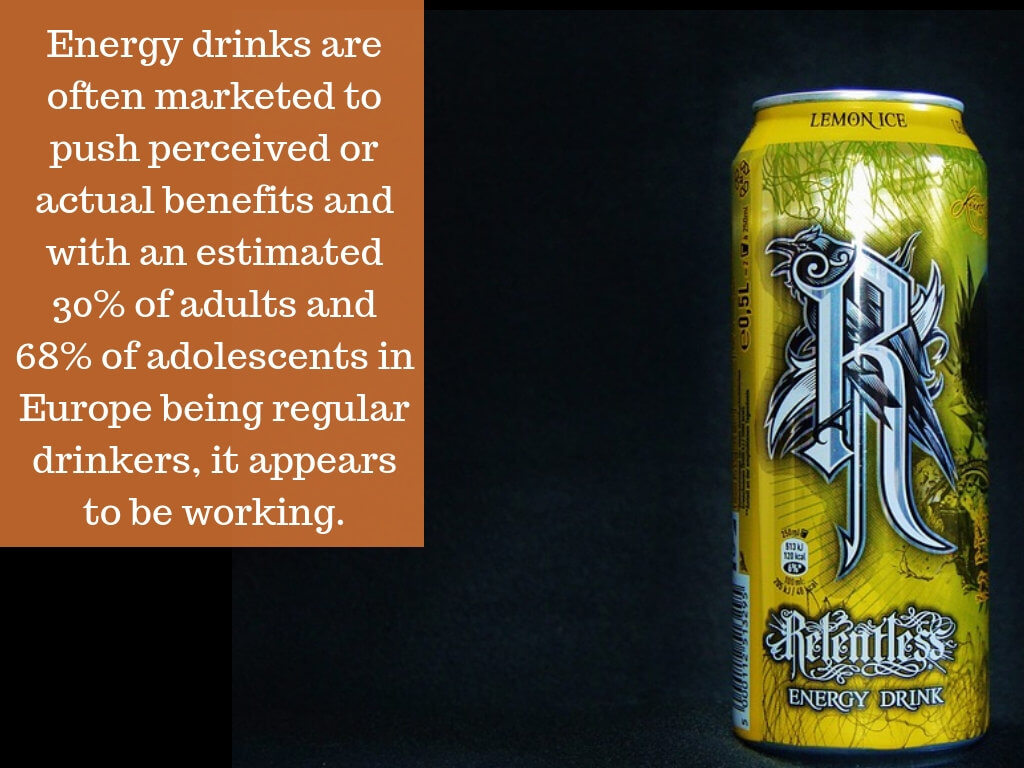As the government brings in new regulations for the sale of energy drinks, some manufacturers and ministers are shouting about the government overreaching and becoming a nanny state. There are also many campaigners, such as Jamie Oliver, who are delighted by the news. Here we’ll look at all the facts and discuss potential ways the new regulation could change the sector, so you can make up your own mind.
The main cause for concern for campaigners against the sale of energy drinks to children is the ingredients. Energy drinks, such as Red Bull and Monster, contain high levels of caffeine, vitamins, taurine (an amino acid), and sugar. What’s more, the popularity of energy drinks has risen sharply over the last couple of decades, especially amongst younger people. This increase is partly attributed to their common use as a mixer with alcoholic drinks.
Energy drinks are often marketed to push perceived or actual benefits, such as the ‘Red Bull gives you wings’ slogan. With an estimated 30% of adults and 68% of adolescents in Europe being regular drinkers, it appears to be working.
However, there are also a high number of risks associated with the consumption of energy drinks, especially in certain at-risk groups. According to the NHS, caffeine overdose is associated with high blood pressure, palpitations, convulsions, and nausea and vomiting. Caffeine also reduces insulin sensitivity, which increases the risk of type 2 diabetes.
The caffeine content is potentially even more harmful to pregnant women and children. It has been related to late-term miscarriages, stillbirths and low birth weight, as well as neurological and cardiovascular effects in children and adolescents.
The UK government seems equally concerned about the sugar content, initially making the sales ban proposal as part of their campaign against childhood obesity. The pressure on the government increased when teachers petitioned for them to take action restricting the sale to pupils, stating the drinks are a cause of disruption in the classroom.

Energy drinks sold in EU member states, with a caffeine content greater than 150mg/l are required to carry a label stating, ‘High caffeine content. Not recommended for children or pregnant or breastfeeding women.’ In addition to the European labelling regulations, many member states also enforce their own supplementary restrictions on the sale of energy drinks.
Researchers would like to see an upper limit of caffeine allowed in a single serving of any drink. The marketing practices of manufacturers should be regulated to ensure they are not obviously targeting young people, especially with claims of sporting prowess, when the reality is more closely linked to obesity. They also proposed the sales restrictions for adolescents and children.
Downing Street is currently undergoing a consultation on how to implement a proposed ban, which many think will work exactly like restrictions on cigarettes. The only unanswered question is whether to make the restriction applicable to 16 or 18-year old’s.
The UK’s energy drinks market has been steadily growing for years. According to the British Soft Drinks Association, the market was worth over £2 billion in 2016. Any major change to a market of this size can lead to serious consequences. There are thousands of jobs dependent on the continuation and success of the market. Thankfully, food industry recruitment has been strong and stable in recent years, so any single market change is unlikely to impact the health of the larger market to any great extent.

Many of the changes will make little difference to energy drink producers operating in the UK. They introduced a voluntary code of practice agreeing not to market or promote products to under 16s. The industry knows energy drinks are not suitable for children, as stated on the labelling. The extent it will impact the bottom line is yet to be seen. According to European Food Safety Authority research, approximately 66% of 10 to 16-year-olds regularly consume energy drinks, along with 18% of 3 to 10-year-olds.
This means the producers might not notice much change operationally but may well see a change in the volume being sold. The biggest market for energy drinks in the UK is boys aged 16 to 24, so even a reduction in sales is unlikely to slow down the sector too much.
I started The Sterling Choice with Gareth Whyatt back in August 2013. We’ve always remained true to ourselves and what it is we’re trying to achieve – A great company with great peo...